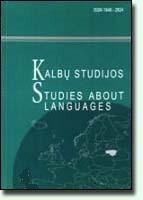Lithuanian politicians as the target of negative emotions
Lithuanian politicians as the target of negative emotions
Author(s): Jelena KirejevaSubject(s): Media studies, Communication studies, Cognitive linguistics, Baltic Languages, Politics and communication
Published by: Kauno Technologijos Universitetas
Keywords: negative stance; emotion; conceptualisation; conceptual metaphor; cultural metaphor;
Summary/Abstract: The present research lies within the realms of cognitive linguistics, cultural linguistics and computer-mediated communication. It focuses on the negative stances adopted by Lithuanian internet users as a response to certain actions undertaken by Lithuanian politicians. The study seeks to establish the correlation between the negative stances conceptualised in online Lithuanian discourse and the negative emotions rendered by them. On the basis of the analysis carried out, the following conclusion can be drawn: negative stances instantiated in the sample communicate the idea of politicians being unnecessary, harmful to the people of Lithuania, devoid of certain human propensities and lacking certain professional characteristics. The emotions of HATE, ANGER, DISGUST and CONTEMPT appear to be congruent and correlate to the negative stances rendered in the sample. They are conceptualised through one conceptual metonymy and a number of conceptual metaphors, such as POLITICIANS ARE ILLNESSES, POLITICIANS ARE CHILDREN, POLITICIANS ARE ANIMALS, POLITICIANS ARE OBJECTS, POLITICIANS ARE FICTITIOUS CHARACTERS, POLITICIANS ARE ARTISTS, etc. Among the source domains drawn upon in the process of metaphorical and metonymical conceptualisations of the negative evaluative judgements are the BODY, THEATRE, MEDICINE, GLOBAL BIODIVERSITY, etc. domains.
Journal: Kalbų Studijos
- Issue Year: 2024
- Issue No: 45
- Page Range: 107-118
- Page Count: 12
- Language: English

